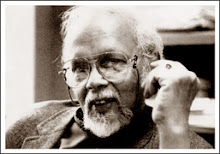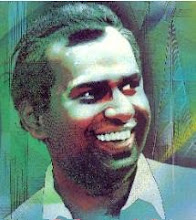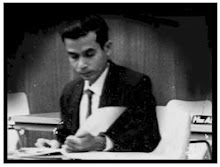 Mata Vedi Tiyannedda |
| |
Only a few are reluctant to leave off the stage for a lucrative medium. Rajitha Disanayaka is one diehard follower of the stage, who has been in the field for two decades scripting and directing.
Rajitha is back with his latest four plays: Mata Vedi Tiyannedda (1999); Veeraya Merila (2002); Sihina Horu Aran (2004); Apahu Herenna Be (2008) respectively on July 23, 24, 25 and 26 at 7 p.m. at Lionel Wendt. Schoolgoers and undergraduates can claim tickets at a concessionary rate. These plays, Rajitha muses, is a call to re-witness our contemporary society.
“I like to work live with people. The stage play is performed by one group of people for another set of people. Other media do not have this splendid beauty, so I still would prefer to stay in this industry. But in a way I have contributed to other media as well.”
Miracle
Rajitha was the co-scripter with Asoka Handagama and Piyal Kariyawasam in Me Paren Enna. With the small screen conquering our taste buds, naturally one would ask if the stage could survive.
“For me, it is a myth. Believe me I could stage Veeraya Merila more than 100 times. I have staged other plays more than 50 times. This would be nothing more than a miracle, if the people think they are better off without the stage. I always love seeing the halls packed with audience, and so to say I have seen it actually.”
Stage love is something that ran in his family. His father would not miss a single stage play when Rajitha was just a kid. The good deal of exposure to the stage made him try out a stage play one day.
He recollects the days of beginning when he was doing A/Ls. “It was the notorious 1988 period. As seniors in the school, we wanted to demonstrate our protest. So we decided to stage a play, which I scripted.”
That made him realise how powerful the stage play medium is. The talent tagged along him to the Colombo University too. He scripted down almost every thought that struck him. He was never short of ideas for plots.
Masterstroke
Classical scholars detected the prodigal traits in his stage plays. Some stated Rajitha was immensely influenced from foreign plays. It was so, since he read and watched many foreign stage plays translated as well as in original form.
Ironically he never got a chance to study the stage play: his school and university did not have the subject to offer. He had literature and stage plays to reach the masterstroke, which could have been spoiled by the traditional drama schools.
His talents over the first year at the University was enough to earn him senior batchmates like Liyanage Amarakeerthi, now a senior lecturer. He was warmly welcome in most of the intellectual circles. Following his MA at the Sri Jayawardenepura University, he received a one-year Presidential Scholarship to Indiana State. Where he had a chance to watch all kinds of plays as well as a training in directing and scripting.
Asked whether he would take up translations in future, Rajitha thinks, it is still up in the air.
“I entered this field as a scripter and a director. Still I don’t think I should take up that job. I respect translations because they give us an idea about different cultures. But I like my own plays better.”
Rajitha has not thought of giving up both scripting and directing too.
“There are legendary directors who always used a different script. There are great scriptwriters who did not direct too. I may give up one of these in future, or perhaps not. What I feel is that when I direct my own script, I get a chance to brush it up.”
He has published Mata Vedi Tiyannedda, Sakvadavala, Veeraya Merila and Hansayintat Man Asai so far and is to publish Sihina Horu Aran and Apasu Herenna Behe. Rajitha is working as a producer in Sri Lanka Broadcasting Corporation (SLBC).
He enjoys immense freedom at the SLBC which has produced great drama personalities such as Dayananda Gunawardana and Sugathapala de Silva.
The cast, though well known to be busy in both cinema and teledrama industry, is very supportive to Rajitha. “I have been with them for a long time. We are a family, so they are with me whenever I need them.”
Two youths share a room in Mata Vedi Tiyannedda? (Aren’t you going to shoot me?) and everyday they admire the woman next door. They both try to win the woman - but only to realise that the woman belongs to someone else richer than both of them. It is a story about the youths who cannot fulfill their hopes and desires.
Dreams
Veeraya Merila (The Hero is Dead) is all about media manipulation. A bomb blast takes place. For no apparent reason, the dead person is considered the bomber. One journalist attempts to dig, and he is silenced by the gun. The journo’s death turns out hotcakes in the newspaper business.
Sihina Horu Aran (Dreams Robbed) casts a few people holidaying in their native land. Many of them had dreams for a better country, but they have now become stooges. They all reflect how their dreams are shattered, and how helpless they stand.
Apasu Herenna Be (No Return) has a university don who returns to his motherland after obtaining his PhD. He struggles with his own visions. This makes us believe that all of us carry something we cannot share even with an intimate person.






































No comments:
Post a Comment